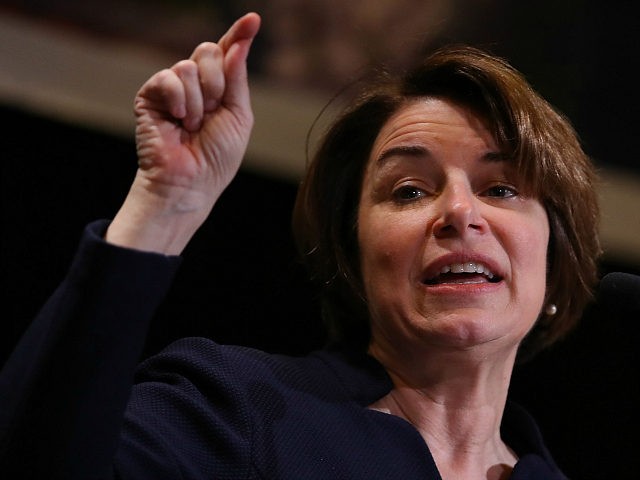Sen. Amy Klobuchar (D-MN) selectively enforced the law regarding financial crimes as a local prosecutor, often to the benefit of friends and political allies.
The bombshell revelations are detailed in Profiles in Corruption: Abuse of Power by America’s Progressive Elite—a new book by Peter Schweizer, a senior contributor at Breitbart News and president of the Government Accountability Institute.
Klobuchar cut a profile as a tough-on-crime prosecutor during her tenure as the chief legal officer of Minnesota’s most populous county in the early 2000s. Not only did she push for locking up more juvenile offenders, but she was also a leading exponent of the “broken windows” theory of policing.
“What I’ve heard again and again is that no crime is a small crime and that we must enforce the law down the line,” she wrote in a policy paper at the time.
Left unsaid, though, is that certain “small” crimes were more likely to warrant prosecution than others, especially depending on one’s personal connection to Klobuchar. As Profiles in Corruption notes, that inequitable approach was nowhere more apparent than “white-collar” crimes.
While Klobuchar aggressively pursued small actors, like airline pilots not paying state income taxes or a home remodeler upcharging his clients, bigger and more nefarious financial crimes were ignored.
“But the largest financial fraud by far in her jurisdiction involved a massive conspiracy that she never even appeared to investigate, despite plenty of warning signs,” Schweizer writes. “It involved the second-largest Ponzi scheme in American history to date.”
The man at the center of the crime was Tom Petters, a Minnesota philanthropist and longtime Democrat campaign donor. Petters, who counted among his friends not only Klobuchar, but also former Vice President Walter Mondale, operated a series of shady investment funds.
Between 1998 and 2008, roughly the years spanning Klobuchar’s tenure as prosecutor, Petters raised nearly $4 billion for his hedge funds. More of than not, individuals entrusting him with their money would never see a penny of their investment returned.
As Schweizer elaborates, there were plenty of warning signs that something was off. Petters was consistently facing legal troubles, either from clients he had failed to repay or from his own improper conduct, like writing bad checks. More troubling, however, was the fact that his business associates kept getting convicted of wrongdoing, often by Klobuchar herself.
“In January 1999, just weeks into her tenure, potential evidence of the Ponzi scheme began to cross her desk,” Schweizer writes. “Officers from her office raided the home of Richard Hettler and Ruth Kahn. They were Petters investors.”
Documents seized during the raid reportedly implicated Petters in a “mutually beneficial and highly illegal financial scheme.” Despite securing convictions for both Hettler and Khan, Klobuchar seemed to make no attempt to move against Petters or “apparently even investigate” his part in the matter.
Klobuchar’s unwillingness to look into Petters coincided with a time their professional relationship was flourishing.
When Klobuchar first ran for county attorney in 1998, Petters and his associates only donated $8,500 to her campaign. By the time she was running for the United States Senate in 2006, Petters had emerged as one of Klobuchar’s most prolific financial backers. During that campaign alone, the Ponzi scheme operator donated more than $120,000, earning him the designation of being one of Klobuchar’s single largest campaign contributors.
The donations also seemed to signal a strong personal relationship. When the FBI finally caught up to the illegal operation and raided Petters’ office and home in 2008, he admitted on a wire-tap recording that Klobuchar had called him in the aftermath. Even though the confines of that conversation were never made public, the events that followed seemed to indicate Klobuchar was sympathetic to the plight of her longtime donor.
“Reportedly Klobuchar’s aides suggested a close family friend, Doug Kelley … provide legal help,” Schweizer writes. “Kelley had been a longtime friend of Klobuchar’s father, both as a lawyer to help him with legal issues and as a mountain-climbing partner.”
Ultimately, Kelley was unable to make much of a difference. Petters’ fate seemed to be sealed as soon as court proceedings began, especially when law enforcement and judicial officers expressed disbelief that he was able to operate for so long with so many red flags.
“But, it looks to me like [Petters] had friends in high places,” Garrett Vail, an attorney who initially worked on case against Kuhn in 1999, told the Daily Caller. “The only way he ran a $3 billion Ponzi scheme was [that] he had politicians in his pocket.”
In December 2009, Petters was convicted on 20 different counts of mail fraud, money laundering, and wire fraud. He was sentenced to more than 50 years in prison for defrauding investors of more than $3.7 billion.
Klobuchar, for her part, escaped the situation relatively unscathed. The senator was reelected overwhelmingly in 2012, despite attempts by her Republican challenger to make Petters an issue. Reelected again in 2018, Klobuchar is now vying for the Democrat presidential nomination on a platform that relies heavily on her accomplishments in public office.
Those accomplishments, however, only underscore Klobuchar’s selective approach to exercising political power, as Profiles in Corruption exposes.

COMMENTS
Please let us know if you're having issues with commenting.